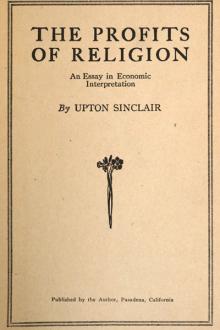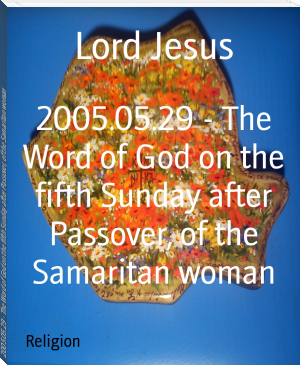The Profits of Religion, Fifth Edition by Upton Sinclair (microsoft ebook reader txt) 📕

- Author: Upton Sinclair
- Performer: -
Book online «The Profits of Religion, Fifth Edition by Upton Sinclair (microsoft ebook reader txt) 📕». Author Upton Sinclair
About six thousand of these "livings" are in the gift of great land owners; one noble lord alone disposes of fifty-six such plums; and needless to say, he does not present them to clergymen who favor radical land-taxes. He gives them to men like himself—autocratic to the poor, easy-going to members of his own class, and cynical concerning the grafts of grace.
In one English village which I visited the living was worth seven hundred pounds, with the use of a fine mansion; as the incumbent had a large family, he lived there. In another place the living was worth a thousand pounds, and the incumbent hired a curate, himself appearing twice a year, on Christmas day and on the King's birth-day, to preach a sermon; the rest of the time he spent in Paris. It is worth noting that in 1808 a law was proposed compelling absentee pluralists—that is, clergymen holding more than one "living"—to furnish curates to do [71] their work; it might be interesting to note that this law met with strenuous clerical opposition, the house of Bishops voting against it without a division. Thus we may understand the sharp saying of Karl Marx, that the English clergy would rather part with thirty-eight of their thirty-nine articles than with one thirty-ninth of their income.
There is always a plentiful supply of curates in England. They are the sons of the less influential ruling families, and of the clergy; they have been trained at Oxford or Cambridge, and possess the one essential qualification, that they are gentlemen. Their average price is two hundred and fifty pounds a year; their function was made clear to me when I attended my first English tea-party. There was a wicker table, perhaps a foot and a half square, having three shelves, one below the other—on the top layer the plates and napkins, on the next the muffins, and on the lowest the cake. Said the hostess, "Will you pass the curate, please?" I looked puzzled, and she pointed. "We call that the curate, because it does the work of a curate."
Graft in Tail
As one of America's head muck-rakers, I found that I was popular with the British ruling classes; they found my books useful in their campaigns against democracy, and they were surprised and disconcerted when they found I did not agree with their interpretation of my writings. I had told of corruption in American politics; surely I must know that in England they had no such evils! I explained that they did not have to; their graft, to use their own legal phrase, was "in tail"; the grafters had, as a matter of divine right, the things which in [72] America they had to buy. In America, for instance, we had a Senate, a "Millionaire's Club", for admission to which the members paid in cash; but in England the same men came to the same position as their birth-right. Political corruption is not an end in itself, it is merely a means to exploitation; and of exploitation England has even more than America. When I explained this, my popularity with the British ruling classes vanished quickly.
As a matter of fact, England is more like America than she realizes; her British reticence has kept her ignorant about herself. I could not carry on my business in England, because of the libel laws, which have as their first principle "the greater the truth, the greater the libel". Englishmen read with satisfaction what I write about America; but if I should turn my attention to their own country, they would send me to jail as they sent Frank Harris. The fact is that the new men in England, the lords of coal and iron and shipping and beer, have bought their way into the landed aristocracy for cash, just as our American senators have done; they have bought the political parties with campaign gifts, precisely as in America; they have taken over the press, whether by outright purchase like Northcliffe, or by advertising subsidy—both of which methods we Americans know. Within the last decade or two another group has been coming into control; and not merely is this the same class of men as in America, it frequently consists of the same individuals. These are the big money-lenders, the international financiers who are the fine and final flower of the capitalist system. These gentlemen make the world their home—or, as Shakespeare puts it, [73] their oyster. They know how to fit themselves to all environments; they are Catholics in Rome and Vienna, country gentlemen in London, bons vivants in Paris, democrats in Chicago, Socialists in Petrograd, and Hebrews wherever they are.
And of course, in buying the English government, these new classes have bought the English Church. Skeptics and men of the world as they are, they know that they must have a Religion. They have read the story of the French revolution, and the shadow of the guillotine is always over their thoughts; they see the giant of labor, restless in his torment, groping as in a nightmare for the throat of his enemy. Who can blind the eyes of this giant, who can chain him to his couch of slumber? There is but one agent, without rival—the Keeper of the Holy Secrets, the Deputy of the Almighty Awfulness, the Giver and Withholder of Eternal Life. Tremble, slave! Fall down and bow your forehead in the dust! I can see in my memory the sight that thrilled my childhood—my grim old Bishop, clad in his gorgeous ceremonial robes, stretching out his hands over the head of the new priest, and pronouncing that most deadly of all the Christian curses:
"Whose sins thou dost forgive, they are forgiven; and whose sins thorn dost retain, they are retained!"
Bishops and Beer
For example, the International Shylocks wanted the diamond mines of South Africa—wanted them more firmly governed and less firmly taxed than could be arranged with the Old Man of the Boers. So the armies of England were sent to subjugate the country. You might think they would have had the good taste to [74] leave the lowly Jesus out of this affair—but if so, you have missed the essential point about established religion. The bishops, priests, and deacons are set up for the populace to revere, and when the robber-classes need a blessing upon some enterprise, then is the opportunity for the bishops, priests and deacons to earn their "living." During the Boer war the blood-lust of the English clergy was so extreme that writers in the dignified monthly reviews felt moved to protest against it. When the pastors of Switzerland issued a collective protest against cruelties to women and children in the South African concentration-camps, it was the Right Reverend Bishop of Winchester who was brought forward to make reply. Nowadays all England is reading Bernhardi, and shuddering at Prussian glorification of war; but no one mentions Bishop Welldon of Calcutta, who advocated the Boer war as a means of keeping the nation "virile"; nor Archbishop Alexander, who said that it was God's way of making "noble natures".
The British God had other ways of improving nations—for example, the opium traffic. The British traders had been raising the poppy in India and selling its juice to the Chinese. They had made perhaps a hundred million "noble natures" by this method; and also they were making a hundred million dollars a year. The Chinese, moved by their new "virility," undertook to destroy some opium, and to stop the traffic; whereupon it was necessary to use British battle-ships to punish and subdue them. Was there any difficulty in persuading the established church of Jesus to bless this holy war? There was not! Lord Shaftesbury, himself the most devout of Anglicans, commented with horror [75] upon the attitude of the clergy, and wrote in his diary:
I rejoice that this cruel and debasing opium war is terminated. We have triumphed in one of the most lawless, unnecessary, and unfair struggles in the records of history; and Christians have shed more heathen blood in two years, than the heathens have shed of Christian blood in two centuries.
That was in 1843; for seventy years thereafter pious England continued to force the opium traffic upon protesting China, and only in the last two or three years has the infamy been brought to an end. Throughout the long controversy the attitude of the church was such that Li Hung Chang was moved to assert in a letter to the Anti-Opium Society:
Opium is a subject in the discussion of which England and China can never meet on a common ground. China views the whole question from a moral standpoint, England from a fiscal.
And just as the Chinese people were poisoned with opium, so the English people are being poisoned with alcohol. Both in town and country, labor is sodden with it. Scientists and reformers are clamoring for restriction;—and what prevents? Head and front of the opposition for a century, standing like a rock, has been the Established Church. The Rev. Dawson Burns, historian of the early temperance movement, declares that "among its supporters I cannot recall one Church of England minister of influence." When Asquith brought in his bill for the restriction of the traffic in beer, he was confronted with petitions signed by members of the clergy, protesting against the act. And what was the basis of their protest? That beer is a food and not a poison? Yes, of course; but also that there was property invested in brewing it. Three hundred and thirty-two [76] clergy of the diocese of Peterborough declared:
We do strongly protest against the main provisions of the present bill as creating amongst our people a sense of grave injustice as amounting to a confiscation of private property, spelling ruin for thousands of quite innocent people, and provoking deep and widespread resentment, which must do harm to our cause and hinder our aims.
I have come upon references to another and even more plainspoken petition, signed by 1,280 clergymen; but war-time facilities for research have not enabled me to find the text. In Prof. Henry C. Vedder's "Jesus Christ and the Social Question," we read:
It was authoritatively stated a short time ago that Mr. Asquith's temperance bill was defeated in Parliament through the opposition of clergymen who had invested their savings in brewery stock, the profits of which might have been lessened by the bill.
Also the power of the clergy, combined with the brewer, was sufficient to put through Parliament a provision that no prohibition legislation should ever be passed without providing for compensation to the owners of the industry. Today, all over America, appeals are being made to the people to eat less grain; the grain is being shipped to England, some of it to be made into beer; and a high Anglican prelate, his Grace the Archbishop of York, comes to America to urge us to increased sacrifices, and in his first newspaper interview takes occasion to declare that his church is not in favor of prohibition as a measure of war-time economy!
Anglicanism and Alcohol
This partnership of Bishops and Beer is painfully familiar to British radicals; they see it at work in [77] every election—the publican confusing the voters with spirits, while the parson confuses them with spirituality. There are two powerful societies in England employing this deadly combination—the "Anti-Socialist Union" and the "Liberty and Property Defense League." If you scan the lists of the organizers, directors and subsidizers of these satanic institutions, you find Tory politicians





Comments (0)